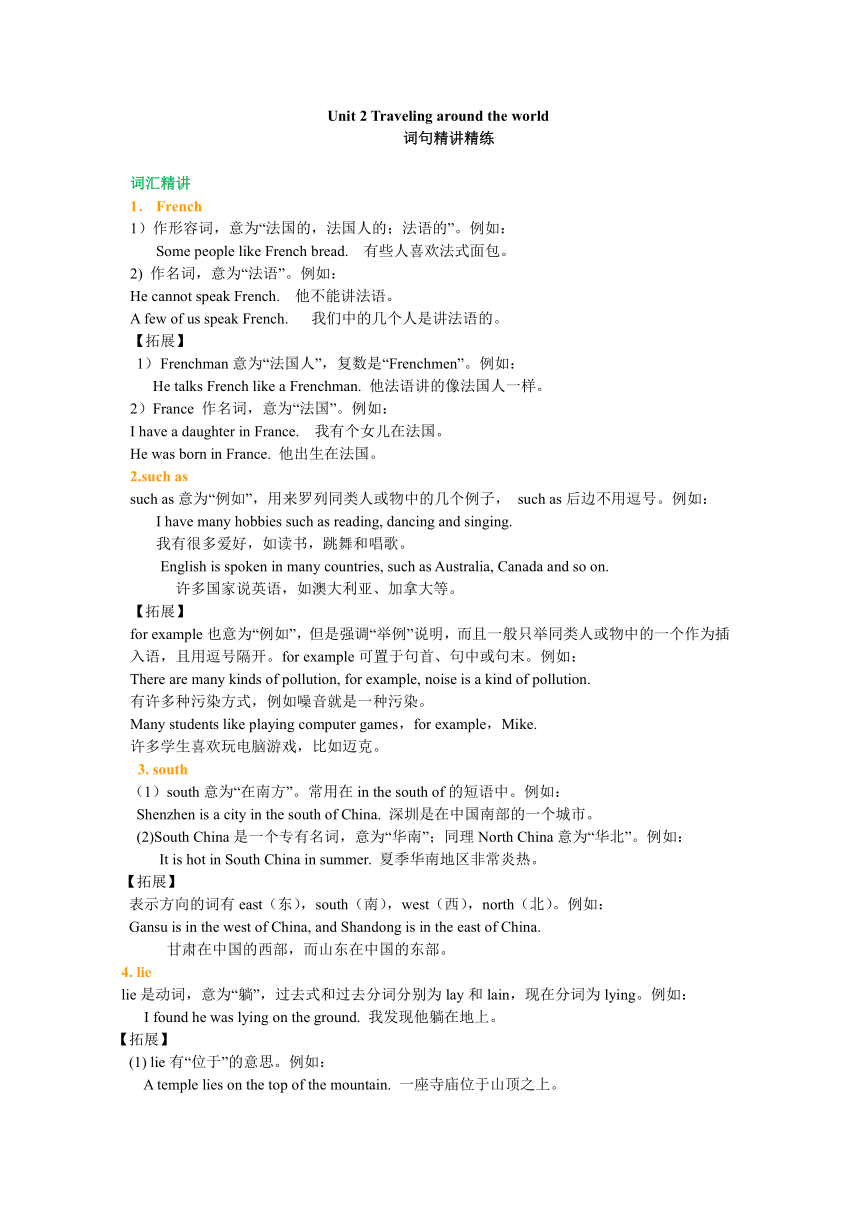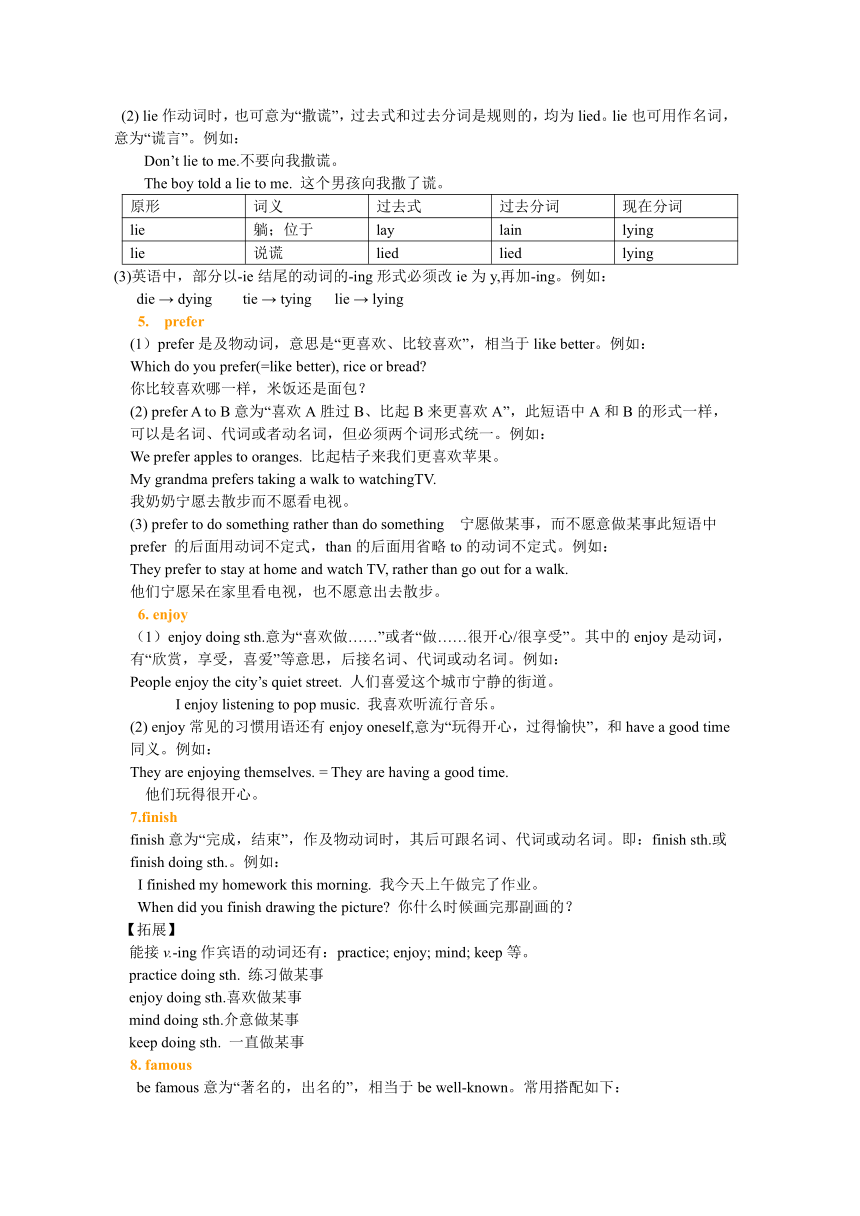Module 1 People and places Unit 2 Travelling around the world .基础知识知识点
文档属性
| 名称 | Module 1 People and places Unit 2 Travelling around the world .基础知识知识点 |

|
|
| 格式 | doc | ||
| 文件大小 | 40.0KB | ||
| 资源类型 | 教案 | ||
| 版本资源 | 牛津深圳版 | ||
| 科目 | 英语 | ||
| 更新时间 | 2023-07-12 08:43:08 | ||
图片预览


文档简介
Unit 2 Traveling around the world
词句精讲精练
词汇精讲
French
1)作形容词,意为“法国的,法国人的;法语的”。例如:
Some people like French bread. 有些人喜欢法式面包。
2) 作名词,意为“法语”。例如:
He cannot speak French. 他不能讲法语。
A few of us speak French. 我们中的几个人是讲法语的。
【拓展】
Frenchman意为“法国人”,复数是“Frenchmen”。例如:
He talks French like a Frenchman. 他法语讲的像法国人一样。
2)France 作名词,意为“法国”。例如:
I have a daughter in France. 我有个女儿在法国。
He was born in France. 他出生在法国。
2.such as
such as意为“例如”,用来罗列同类人或物中的几个例子, such as后边不用逗号。例如:
I have many hobbies such as reading, dancing and singing.
我有很多爱好,如读书,跳舞和唱歌。
English is spoken in many countries, such as Australia, Canada and so on.
许多国家说英语,如澳大利亚、加拿大等。
【拓展】
for example也意为“例如”,但是强调“举例”说明,而且一般只举同类人或物中的一个作为插入语,且用逗号隔开。for example可置于句首、句中或句末。例如:
There are many kinds of pollution, for example, noise is a kind of pollution.
有许多种污染方式,例如噪音就是一种污染。
Many students like playing computer games,for example,Mike.
许多学生喜欢玩电脑游戏,比如迈克。
3. south
(1)south意为“在南方”。常用在in the south of的短语中。例如:
Shenzhen is a city in the south of China. 深圳是在中国南部的一个城市。
(2)South China是一个专有名词,意为“华南”;同理North China意为“华北”。例如:
It is hot in South China in summer. 夏季华南地区非常炎热。
【拓展】
表示方向的词有east(东),south(南),west(西),north(北)。例如:
Gansu is in the west of China, and Shandong is in the east of China.
甘肃在中国的西部,而山东在中国的东部。
4. lie
lie是动词,意为“躺”,过去式和过去分词分别为lay和lain,现在分词为lying。例如:
I found he was lying on the ground. 我发现他躺在地上。
【拓展】
(1) lie有“位于”的意思。例如:
A temple lies on the top of the mountain. 一座寺庙位于山顶之上。
(2) lie作动词时,也可意为“撒谎”,过去式和过去分词是规则的,均为lied。lie也可用作名词,意为“谎言”。例如:
Don’t lie to me.不要向我撒谎。
The boy told a lie to me. 这个男孩向我撒了谎。
原形 词义 过去式 过去分词 现在分词
lie 躺;位于 lay lain lying
lie 说谎 lied lied lying
(3)英语中,部分以-ie结尾的动词的-ing形式必须改ie为y,再加-ing。例如:
die → dying tie → tying lie → lying
5. prefer
(1)prefer是及物动词,意思是“更喜欢、比较喜欢”,相当于like better。例如:
Which do you prefer(=like better), rice or bread
你比较喜欢哪一样,米饭还是面包?
(2) prefer A to B意为“喜欢A胜过B、比起B来更喜欢A”,此短语中A和B的形式一样,可以是名词、代词或者动名词,但必须两个词形式统一。例如:
We prefer apples to oranges. 比起桔子来我们更喜欢苹果。
My grandma prefers taking a walk to watchingTV.
我奶奶宁愿去散步而不愿看电视。
(3) prefer to do something rather than do something 宁愿做某事,而不愿意做某事此短语中prefer 的后面用动词不定式,than的后面用省略to的动词不定式。例如:
They prefer to stay at home and watch TV, rather than go out for a walk.
他们宁愿呆在家里看电视,也不愿意出去散步。
6. enjoy
(1)enjoy doing sth.意为“喜欢做……”或者“做……很开心/很享受”。其中的enjoy是动词,有“欣赏,享受,喜爱”等意思,后接名词、代词或动名词。例如:
People enjoy the city’s quiet street. 人们喜爱这个城市宁静的街道。
I enjoy listening to pop music. 我喜欢听流行音乐。
(2) enjoy常见的习惯用语还有enjoy oneself,意为“玩得开心,过得愉快”,和have a good time同义。例如:
They are enjoying themselves. = They are having a good time.
他们玩得很开心。
7.finish
finish意为“完成,结束”,作及物动词时,其后可跟名词、代词或动名词。即:finish sth.或finish doing sth.。例如:
I finished my homework this morning. 我今天上午做完了作业。
When did you finish drawing the picture 你什么时候画完那副画的?
【拓展】
能接v.-ing作宾语的动词还有:practice; enjoy; mind; keep等。
practice doing sth. 练习做某事
enjoy doing sth.喜欢做某事
mind doing sth.介意做某事
keep doing sth. 一直做某事
8. famous
be famous意为“著名的,出名的”,相当于be well-known。常用搭配如下:
(1) be famous for表示“因……而出名”。例如:
The area is famous for its green tea. 这个地区因绿茶而出名。
Einstein was famous for his Theory of Relativity. 爱因斯坦因他的“相对论”而著名。
(2)be famous as表示“作为……而出名”。例如:
Einstein was famous as a great scientist.
爱因斯坦作为一位伟大的科学家而出名。
The area is famous as a green tea producing place.
这个地区作为绿茶产地很出名。
句式精讲
This is the place to go if you want to visit...?
这是含有if引导的条件状语从句的复合句,条件状语从句常用一般现在时表示将来,而主句用一般将来时,有时主句也可以用含有情态动词的句子。if意为“如果”。例如:
If the rain doesn’t stop, we will stay here.
如果这场雨不停的话,我们就呆在这儿。
They can’t pass the exam if they don’t study hard now.
如果他们现在不努力学习,就不可能通过考试。
Why not visit France this year
(1) “Why not + 动词原形 + 其他?”相当于“Why don’t you + 动词原形 + 其他?”并不表示疑问,而是作建议、询问。例如:
— Why not play football with us 为什么不和我们去踢足球呢?
— That sounds like a good idea. 这是个好主意。
Why not go with us = Why don’t you go with us
为什么不同我们一起去呢?
(2) Why not 意为“为什么不”,询问被否定的原因。例如:
— You can’t go there alone. 你不能单独去那里。
— Why not 为什么不呢?
(3) why not用在口语中表示赞同,意为“当然,好啊”。例如:
— Let’s go to the movies. 我们看电影吧。
— Why not 好啊!
...one of the most beautiful bell towers ...
one of +the +形容词最高级+复数名词/代词,意为“最……之一”,作主语时,谓语动词用单数形式。例如:
His brother is one of the tallest boys in the class.
他弟弟是这个班最高的男生之一。
The song is one of the most popular songs.
这首歌是最流行的歌之一。
4. Where would you like to go on holiday
..would like to...意为“想要做某事”。 它的句式结构如如下:
(1) 肯定句:
would like 后接名词或代词;would like to 后接动词原形,would 常和主语缩写为“主语+’d”。例如:
I’d like a cup of tea. 我想喝一杯茶。
He’d like to see a film. 他想看电影。
⑵否定句:
在would 后加not,意为“不愿意做……”,would not 缩写为wouldn’t。 例如:
I wouldn’t like to go to the cinema. 我不想去看电影。
⑶疑问句:
把would 提到主语前即可。例如:
Would you like to go to the cinema 你愿意去看电影吗?
⑷答语:
若邀请某人做某事,肯定回答用Yes, I’d like/love to ;否定回答用I’d like/love to ,but… 例如:
—Would you like to see a film?你愿意去看电影吗?
—Yes, I’d love to. 是的,我愿意。
若邀请某人吃(喝)东西,肯定回答用Yes, please. 否定回答用No, thank you. 例如:
—Would you like some tea 你想喝茶吗?
—No, thank you. 不,谢谢。
It is not only beautiful, but also strange...
(1)not only...but also的意思是“不但……而且……”,连接两个并列成分,如果连接两个主语的时候,谓语动词要和also后面的主语保持一致。例如:
Not only my mother but also I like to go to the garden.
不仅妈妈而且我也喜欢去公园。
He plays not only the piano but also the violin.
他不仅玩钢琴还玩小提琴。
(2) 以not only…but also 开头的句子往往引起倒装。例如:
Not only does the sun give us light but also it gives us heat.
太阳不仅给我们光还给我们热。
PAGE
词句精讲精练
词汇精讲
French
1)作形容词,意为“法国的,法国人的;法语的”。例如:
Some people like French bread. 有些人喜欢法式面包。
2) 作名词,意为“法语”。例如:
He cannot speak French. 他不能讲法语。
A few of us speak French. 我们中的几个人是讲法语的。
【拓展】
Frenchman意为“法国人”,复数是“Frenchmen”。例如:
He talks French like a Frenchman. 他法语讲的像法国人一样。
2)France 作名词,意为“法国”。例如:
I have a daughter in France. 我有个女儿在法国。
He was born in France. 他出生在法国。
2.such as
such as意为“例如”,用来罗列同类人或物中的几个例子, such as后边不用逗号。例如:
I have many hobbies such as reading, dancing and singing.
我有很多爱好,如读书,跳舞和唱歌。
English is spoken in many countries, such as Australia, Canada and so on.
许多国家说英语,如澳大利亚、加拿大等。
【拓展】
for example也意为“例如”,但是强调“举例”说明,而且一般只举同类人或物中的一个作为插入语,且用逗号隔开。for example可置于句首、句中或句末。例如:
There are many kinds of pollution, for example, noise is a kind of pollution.
有许多种污染方式,例如噪音就是一种污染。
Many students like playing computer games,for example,Mike.
许多学生喜欢玩电脑游戏,比如迈克。
3. south
(1)south意为“在南方”。常用在in the south of的短语中。例如:
Shenzhen is a city in the south of China. 深圳是在中国南部的一个城市。
(2)South China是一个专有名词,意为“华南”;同理North China意为“华北”。例如:
It is hot in South China in summer. 夏季华南地区非常炎热。
【拓展】
表示方向的词有east(东),south(南),west(西),north(北)。例如:
Gansu is in the west of China, and Shandong is in the east of China.
甘肃在中国的西部,而山东在中国的东部。
4. lie
lie是动词,意为“躺”,过去式和过去分词分别为lay和lain,现在分词为lying。例如:
I found he was lying on the ground. 我发现他躺在地上。
【拓展】
(1) lie有“位于”的意思。例如:
A temple lies on the top of the mountain. 一座寺庙位于山顶之上。
(2) lie作动词时,也可意为“撒谎”,过去式和过去分词是规则的,均为lied。lie也可用作名词,意为“谎言”。例如:
Don’t lie to me.不要向我撒谎。
The boy told a lie to me. 这个男孩向我撒了谎。
原形 词义 过去式 过去分词 现在分词
lie 躺;位于 lay lain lying
lie 说谎 lied lied lying
(3)英语中,部分以-ie结尾的动词的-ing形式必须改ie为y,再加-ing。例如:
die → dying tie → tying lie → lying
5. prefer
(1)prefer是及物动词,意思是“更喜欢、比较喜欢”,相当于like better。例如:
Which do you prefer(=like better), rice or bread
你比较喜欢哪一样,米饭还是面包?
(2) prefer A to B意为“喜欢A胜过B、比起B来更喜欢A”,此短语中A和B的形式一样,可以是名词、代词或者动名词,但必须两个词形式统一。例如:
We prefer apples to oranges. 比起桔子来我们更喜欢苹果。
My grandma prefers taking a walk to watchingTV.
我奶奶宁愿去散步而不愿看电视。
(3) prefer to do something rather than do something 宁愿做某事,而不愿意做某事此短语中prefer 的后面用动词不定式,than的后面用省略to的动词不定式。例如:
They prefer to stay at home and watch TV, rather than go out for a walk.
他们宁愿呆在家里看电视,也不愿意出去散步。
6. enjoy
(1)enjoy doing sth.意为“喜欢做……”或者“做……很开心/很享受”。其中的enjoy是动词,有“欣赏,享受,喜爱”等意思,后接名词、代词或动名词。例如:
People enjoy the city’s quiet street. 人们喜爱这个城市宁静的街道。
I enjoy listening to pop music. 我喜欢听流行音乐。
(2) enjoy常见的习惯用语还有enjoy oneself,意为“玩得开心,过得愉快”,和have a good time同义。例如:
They are enjoying themselves. = They are having a good time.
他们玩得很开心。
7.finish
finish意为“完成,结束”,作及物动词时,其后可跟名词、代词或动名词。即:finish sth.或finish doing sth.。例如:
I finished my homework this morning. 我今天上午做完了作业。
When did you finish drawing the picture 你什么时候画完那副画的?
【拓展】
能接v.-ing作宾语的动词还有:practice; enjoy; mind; keep等。
practice doing sth. 练习做某事
enjoy doing sth.喜欢做某事
mind doing sth.介意做某事
keep doing sth. 一直做某事
8. famous
be famous意为“著名的,出名的”,相当于be well-known。常用搭配如下:
(1) be famous for表示“因……而出名”。例如:
The area is famous for its green tea. 这个地区因绿茶而出名。
Einstein was famous for his Theory of Relativity. 爱因斯坦因他的“相对论”而著名。
(2)be famous as表示“作为……而出名”。例如:
Einstein was famous as a great scientist.
爱因斯坦作为一位伟大的科学家而出名。
The area is famous as a green tea producing place.
这个地区作为绿茶产地很出名。
句式精讲
This is the place to go if you want to visit...?
这是含有if引导的条件状语从句的复合句,条件状语从句常用一般现在时表示将来,而主句用一般将来时,有时主句也可以用含有情态动词的句子。if意为“如果”。例如:
If the rain doesn’t stop, we will stay here.
如果这场雨不停的话,我们就呆在这儿。
They can’t pass the exam if they don’t study hard now.
如果他们现在不努力学习,就不可能通过考试。
Why not visit France this year
(1) “Why not + 动词原形 + 其他?”相当于“Why don’t you + 动词原形 + 其他?”并不表示疑问,而是作建议、询问。例如:
— Why not play football with us 为什么不和我们去踢足球呢?
— That sounds like a good idea. 这是个好主意。
Why not go with us = Why don’t you go with us
为什么不同我们一起去呢?
(2) Why not 意为“为什么不”,询问被否定的原因。例如:
— You can’t go there alone. 你不能单独去那里。
— Why not 为什么不呢?
(3) why not用在口语中表示赞同,意为“当然,好啊”。例如:
— Let’s go to the movies. 我们看电影吧。
— Why not 好啊!
...one of the most beautiful bell towers ...
one of +the +形容词最高级+复数名词/代词,意为“最……之一”,作主语时,谓语动词用单数形式。例如:
His brother is one of the tallest boys in the class.
他弟弟是这个班最高的男生之一。
The song is one of the most popular songs.
这首歌是最流行的歌之一。
4. Where would you like to go on holiday
..would like to...意为“想要做某事”。 它的句式结构如如下:
(1) 肯定句:
would like 后接名词或代词;would like to 后接动词原形,would 常和主语缩写为“主语+’d”。例如:
I’d like a cup of tea. 我想喝一杯茶。
He’d like to see a film. 他想看电影。
⑵否定句:
在would 后加not,意为“不愿意做……”,would not 缩写为wouldn’t。 例如:
I wouldn’t like to go to the cinema. 我不想去看电影。
⑶疑问句:
把would 提到主语前即可。例如:
Would you like to go to the cinema 你愿意去看电影吗?
⑷答语:
若邀请某人做某事,肯定回答用Yes, I’d like/love to ;否定回答用I’d like/love to ,but… 例如:
—Would you like to see a film?你愿意去看电影吗?
—Yes, I’d love to. 是的,我愿意。
若邀请某人吃(喝)东西,肯定回答用Yes, please. 否定回答用No, thank you. 例如:
—Would you like some tea 你想喝茶吗?
—No, thank you. 不,谢谢。
It is not only beautiful, but also strange...
(1)not only...but also的意思是“不但……而且……”,连接两个并列成分,如果连接两个主语的时候,谓语动词要和also后面的主语保持一致。例如:
Not only my mother but also I like to go to the garden.
不仅妈妈而且我也喜欢去公园。
He plays not only the piano but also the violin.
他不仅玩钢琴还玩小提琴。
(2) 以not only…but also 开头的句子往往引起倒装。例如:
Not only does the sun give us light but also it gives us heat.
太阳不仅给我们光还给我们热。
PAGE
